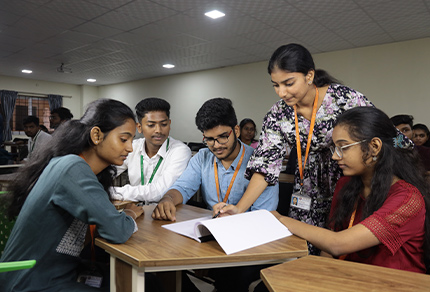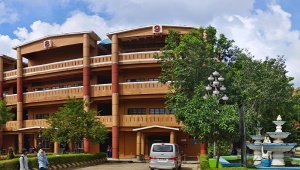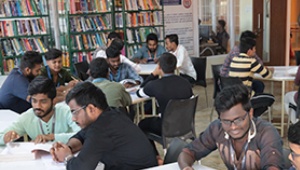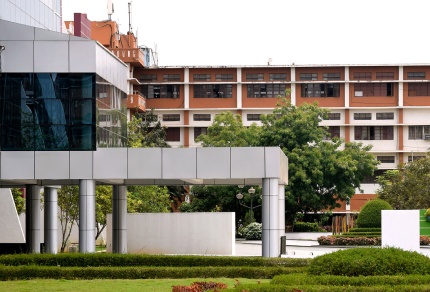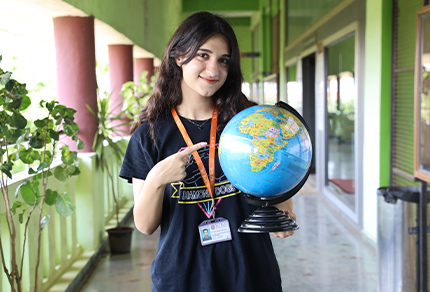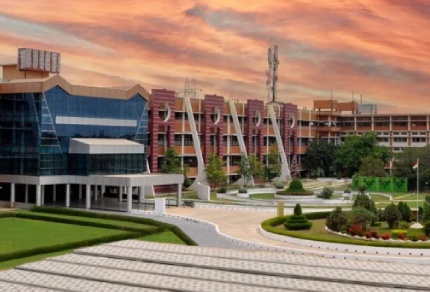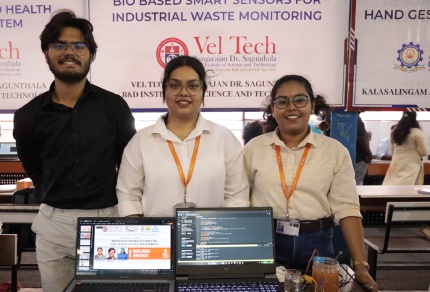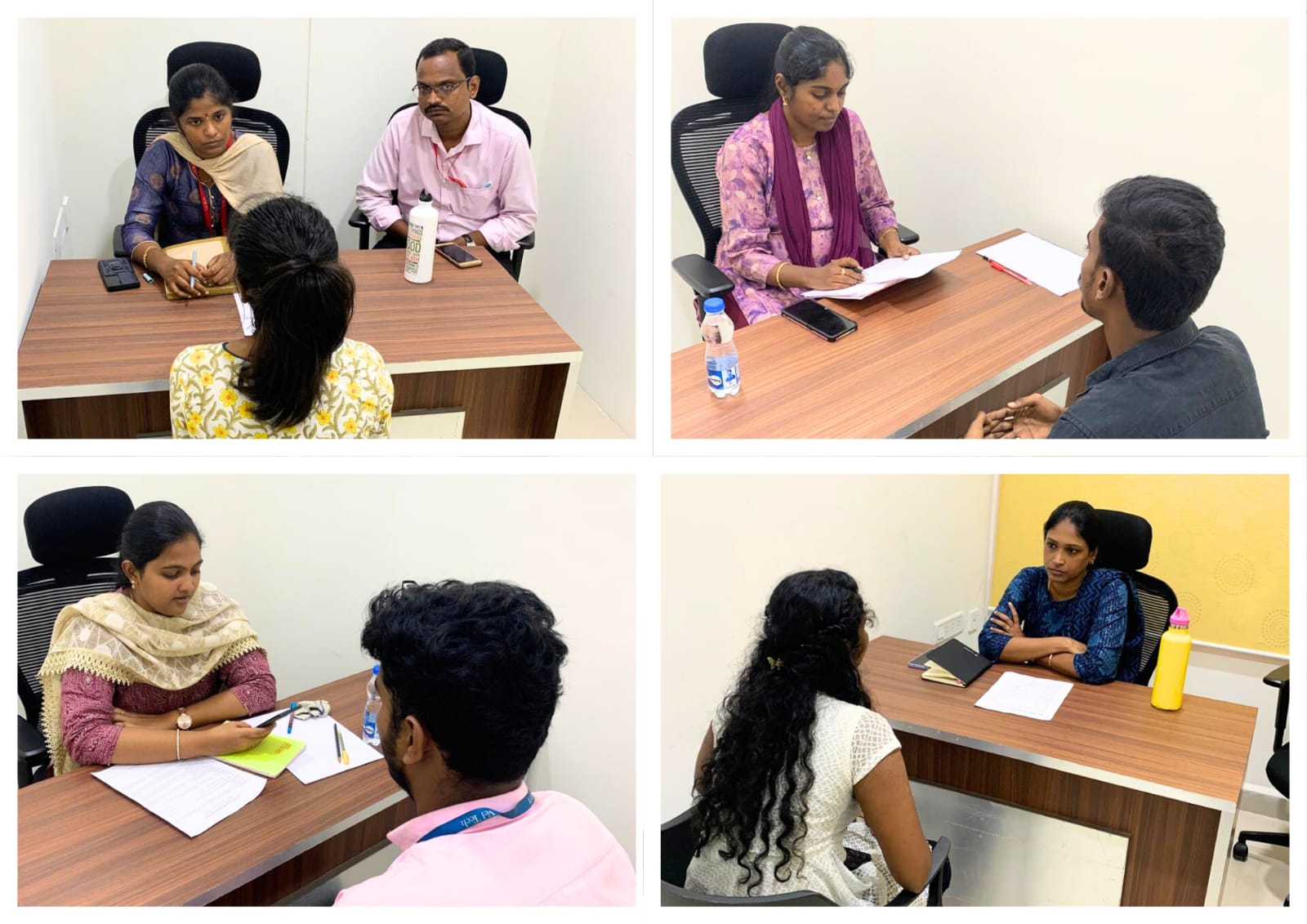
International Opportunities
Vel Tech Rangarajan Dr.Sagunthala R&D Institute of Science and Technology offers opportunities for “Semester Abroad Programme” to students from the Institution to the Foreign Universities both for coursework and for the internship. Students have an option of selecting courses of their preference. This enables to learn from experts in the International Universities.
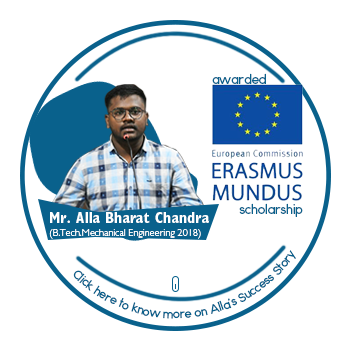
Mr. Alla Bharat Chandra (B.Tech. – Mechanical Engineering / 2018) was awarded ERASMUS MUNDUS SCHOLARSHIPS by European Union to pursue his Master of Engineering (Mechanical Engg. spec. Advanced Design of Ship and Offshore Structures) in 3 Universities from 3 countries. He was an Exchange student to Taiwan during his Final Year under TEEP funding.
This full Scholarship (48000€ / ~ INR 38 Lac) includes:
- The full tuition fees (16000€ / ~ INR 12.7 Lac)
- A monthly allowance for living expenses of 1000€/month (~ INR 80,000 / month)
- Installation fee: 1000€ / ~ INR 80,000 (lump sum at arrival)
- Travel expenses (3000€/year – lump sum) (~ INR 2.4 Lac / Year)
- A health insurance (value 400€/year) (~ INR 31,000 / Year)
The EMSHIP master mobility scheme includes 4 semesters in 2 or 3 different countries and cultures.
One of the 15 students across the World and one of two from India to get this Scholarship.
The “EMSHIP M120” master is organised in 4 semesters, in 24 months and contains 120 Credits





One / Two Semesters project work abroad with Partial / Fully Funded - Directorate of International Relations
Project Work Opportunities for B.Tech Students (Final Year / Final Semester)
Students who wish to pursue project work during their last two semesters, or only during the seventh or final semester of their B.Tech programme, may find the following information very useful.
Highlights:
Several students who opted for final semester project work have secured opportunities to pursue a Master’s degree at renowned universities — with monthly stipends and full tuition waivers.
| Academic Year | Semester | No. of Students Went for Project Work | Went Abroad | Received Financial Support (Full / Partial) |
Admitted to Masters with 100% Tuition Fee Waiver and Monthly Stipend |
|---|---|---|---|---|---|
| 2017-2018 | Even | 62 | 37 | 25 | 40 |
| 2018-2019 | Odd & Even | 9 | 8 | 1 | 29 |
| 2018-2019 | Odd | 13 | 0 | 13 | — |
| Even | 28 | 12 | 16 | ||
| 2018-2019 | Odd & Even | 27 | 4 | 23 | — |
| 2019-2020 | Odd | 9 | 2 | 7 | Applying# |
| 2019-2020 | Even | 35 | 15 | 33 | — |
# – Present Final Year students
Attachments & Resources:
- List of Universities (for Student Exchange or Mobility)
- Internal Mobility Application Form (including required documents and declaration)
Note: Most universities in Taiwan offer a monthly stipend under the TEEP Programme. Interested students should contact the International Office immediately, as opportunities have already been announced.
Application Deadlines:
Each partner university has its own deadline. The deadline for most European universities is end of March.
Applications will be accepted from February 20, 2020 to March 15, 2020.
Financial Support:
Vel Tech offers partial financial support under the Founder’s Foreign Scholarship scheme (requires a separate application).
Contact Information:
For queries or clarification, visit the Directorate of International Office or contact:
Mr. Tamilazhagan G A
📞 +91 96000 94306 (Preferred: WhatsApp message)
For Pre-final Year Students:
If you are truly interested in applying for project work in your final year, you are advised to join the following WhatsApp group:
CERN Technical Student Programme
Space Astronomy Summer Program
CERN Summer Student Programme
CERN Openlab Student Programme
E3 Program (EPFL Excellence in Engineering Program)
Fully Funded Research Internship at EPFL – Switzerland
Dear Pre-Final Year Students,
We are excited to share an incredible opportunity for a fully funded research internship at École Polytechnique Fédérale de Lausanne (EPFL) – one of the world’s most prestigious universities, ranked 18th globally and 11th in Engineering and Technology.
EPFL regularly competes with leading institutions like Cambridge, Oxford, Imperial College London, and ETH Zurich for top spots in Europe. It is one of only two federal technical universities in Switzerland and is globally renowned for its cutting-edge research and facilities.
EPFL Highlights:
- Home to a nuclear reactor (CROCUS)
- Operates a fusion reactor (Tokamak Fusion)
- Hosts the Gene/Q Supercomputer
- Houses P3 bio-hazard facilities (used in the filming of World War Z)
About the Internship – EPFL Excellence in Engineering Program (E3)
- Offers intensive research training in all fields of engineering, science, and technology
- Highly competitive selection process
- Selected students will be contacted directly by EPFL research labs
- Internship duration: 8 to 12 weeks during summer
- Flexible start and end dates to accommodate your academic schedule
- Includes research workshops, lab meetings, and social events
- Opportunity to present your summer research to peers and faculty
For complete details, application deadlines, and eligibility requirements, click here to visit the official EPFL E3 Internship page.
Don’t miss this chance to research at one of the world’s finest institutions and gain invaluable international experience!
Undergraduate Research Award (URA)
Visiting Faculty Opportunity in Philippines
One of our partner University from Philippines, Mapua University, Philippines, is inviting faculty members from Vel Tech as Visiting Faculty for a period of 3 months. Interested Faculty members may express interest with CV through proper Channel for further processing.
Details are as follows:
About the University:
- Founded in the year 1925
- QS Asia University Ranking 2019: 401 – 500
- THE Impact Ranking – Partnerships for the goals 2019: 300+
- 14 Programmes accredited by ABET
- 7 Departments are recognised as Centre of Excellence by Philippines’s Commission on Higher Education.
About the Opportunity:
- Duration: 3 months (Aug. – Oct. / Nov.- Jan. / Feb. – Apr. / May – Jul.)
- Entitlements: accommodation, airfare and honoraria based on the CV
- Eligibility: Faculty members with Ph.D / Pursuing Ph.D (Advanced level)
- Workload: 9 hours per week + Research
ACU Blue Chater Fellowship - Grant up to INR 12.3 Lac (for Travel / Accommodation etc.,) & Research Grant of INR 3.52 Lakhs
Association of Commonwealth Universities (ACU) Blue Charter Fellowships support researchers from across the Commonwealth who are working to combat plastic pollution in our oceans.
What’s on offer?
10 fellowships are available, providing placements of up to six months at ACU member universities or in industry (see a full list of host institutions with research areas below).
Successful fellows will receive a grant of up to £14,000 GBP / ~INR 12,33,000 to cover their travel, accommodation, sustenance, vaccination and visa costs, as well as a research grant of £4,000 GBP / ~ INR 3,52,000 to cover research costs associated with the fellowship.
How to apply?
Please complete the online application form in full by Sunday 16 June.
Host institutions
ACU Blue Charter Fellowships can be hosted by any ACU member institution, or in industry, in any Commonwealth country outside the applicant’s country of residence.
Please see below for a list of potential host institutions. Note that applicants may apply to be hosted at any other ACU member institution.
Prior to applying for the Fellowship, applicants should send an email to their selected potential supervisor outlining their area of research and its alignment to the supervisor’s specialism. Applicants are also required to provide the potential supervisor with a CV and any other relevant supporting information on their research.
Once the supervisor has agreed to host, applicants must complete the online application form by midnight UTC+1 on Sunday 16 June 2019.
If you are an ACU member institution who would like to host a Blue Charter Fellow, please email [email protected].
Brunel University London, UK
Research areas: sustainable design, waste to energy, design for behaviour change, sociology, communications and social change, waste management engineering, materials innovation (particularly biopolymers)
Contact: Professor Geoff Rodgers
Cape Peninsula University of Technology, South Africa
Research areas: Profesoor Opeolu’s research focuses on method development, monitoring, remediation (using biomaterials and nano-materials) and performing ecological health risk assessments of endocrine disrupting chemicals (EDCs) in environmental matrices (water, soil and food).
She has investigated many heavy metals, phenolic compounds, polycyclic aromatic hydrocarbons (PAHs), perflourinated compounds (PFOS and PFOAs) and pharmaceuticals in environmental matrices as well as their toxicities in ecological systems. She launched a Beat plastic pollution campaign in June 2018 and has just started a study on microplastics occurrence in water and wastewater systems. She is interested in qualitative and quantitative analyses of plastics in different media (biotic and abiotic) as well as ecological and human health implications of plastic pollution
Contact: Professor Beatrice Olutoyin Opeolu
Cardiff University, Wales, UK
Research areas: alternative plastics and freshwater ecosystem health, ecosystem function, ecosystem services, ecotoxicology.
Contact: Professor Isabelle Durance
Research areas: environmental psychology, sustainable behaviours and lifestyles, behaviour change, perceptions of plastics in the environment.
Contact: Professor Wouter Poortinga
Council for Scientific and Industrial Research (CSIR), South Africa
Research area: integrated waste management
Contact: Dr Linda Godfrey
Research area: End-of-life options of plastic waste and designing biodegradable bioplastics
Contact: Dr Sudhakar Muniyasamy
Covenant University, Nigeria
Research areas: Timescale monitoring and mapping of microplastics in the marine environment; Identification, characterisation and quantification of microplastics in water, intertidal and core sediments, and biota of tropical coastal ocean.
In addition, we promote approaches to reduce inputs of plastics into the marine environment through recycling, education and public awareness.
Contact: Professor Nsikak Benson
Dalhousie University, Canada
Research areas: policy strategies to reduce use or distribution of single-use plastics, impacts of plastics on wildlife, outreach, education and awareness that targets change in human behaviour around plastics
Contact: Dr Tony Walker
Durham University, UK
Research areas: We are investigating the issue from a business point-of-view and trying to see if new business models, advance technology, and, educating the consumers can address the issues. So any issue looking at the problem to identify a business based solution will be of interest. Some key projects that we have keen interest include
Measuring the size of waste economy
Designing new business models to convert waste into valuable products
Developing a waste to energy network
Designing a local circular economy for waste to value
Identifying the best waste disposal strategy
Developing a facility location model for efficient waste collection and processing
Real-time vehicle routing for efficient waste collection
IoT based waste collection models
Contact: Dr Manish Shukla
Exeter University, UK
Research areas: coastal and marine governance, ecotoxicology, circular economy, fisheries and aquaculture, marine vertebrate ecology, maritime humanities, ocean health and well-being, ocean systems, ocean technology.
Contact: Professor Brendan Godley
Jawaharlal Nehru University, New Delhi, India
Research areas: Environmental Sustainability; Waste Management; Waste to energy programme; E-Waste; Bio-degradable plastic waste; Indigenous Practices for sustainable development; Science, technology and Society Study, Higher Education.
Contact: Professor Madhav Govind
Keele University, UK
Research areas: materials studies and development studies, focused on plastics
Contact: Dr Deirdre McKay
Research areas: sustainable resources science, focused on plastics
Contact: Dr Sharon George
Lancaster University, UK
Research areas: Qualitative research on key cross-organizational and technical barriers/enablers within collective corporate efforts to end plastic waste in South East Asian marine environment; Sustainable Asset Valuation of new Waste Infrastructure in key South East Asian countries; Exploring cultural dimensions to consumer recycling attitudes and behaviours on plastic waste and recycling; Resolving social inequities within the informal and formal sectors of plastic waste infrastructure.
Contact: Desna Mackenzie, contact co-ordinator for Supervisors based at Lancaster University
Massey University, New Zealand
Research areas: International, regional and national plastic pollution governance, democratisation of science and policy, social licence to operate, STS, material culture, political ecologies of plastics, waste colonialism, precautionary approach, risk and uncertainty. Also offered is the opportunity to work with the ‘Palmy Plastic Pollution Challenge’: a citizen science based, ‘living labs’ research project to measure plastic pollution in the Manawatu River.
Massey University can offer a fellow the opportunity to support the sustainability strategy of an Indigenous New Zealand Fisheries company. The successful fellow will help develop strategies to reduce plastics, seek plastics alternatives, minimise negative impacts of plastics usage, and to reclaim, recycle, and reuse lost and legacy plastics.
Contact: Dr Trisia Farrelly
Memorial University of Newfoundland, Canada
Research area: The preparation and study of new materials targeting an understanding of biodegradability under different conditions. Our materials are typically prepared used renewable feedstocks, and experiments range from catalytic synthesis, degradation studies and materials characterization including GPC, NMR and microscopy.
Contact: Dr Francesca Kerton
Research area: feminist, community-based, and anti-colonial science, monitoring plastics in food webs, mitigating fishing gear.
Contact: Dr Max Liboiron
Nanyang Technological University, Singapore
Research areas: The role of microorganisms in the bioremediation of plastics, both biodegradable and non-biodegradable. The efficacy of waste water treatment in the capture and isolation of plastics.
Contacts: Dr Jamie Hinks and Dr Stephen Summers
National University of Singapore
Research areas: Microplastic particles and their characterisation, Bioimpact of micro- and nanoplastics on marine environments, monitoring the toxicity of synthetic fluorescent microplastic and nanoplastic particles using marine animal models, developing new polymers, nanomaterial synthesis and characterisation.
Contact: Professor Suresh Valiyaveettil
Nature’s Valley Trust, South Africa
Research areas: We use long term ecological field research programs to tackle locally relevant conservation issues in our region. Based on sound science, we design conservation intervention programs that aim to reduce identified impacts, and to raise awareness through strategic conservation education programs that engage communities involved. In terms of plastics research, we aim to reduce single use plastics on our beaches, and in so doing reduce the direct impact on local wildlife.
In terms of research, we conduct baseline monitoring on marine debris deposited on several beaches in our region, which we correlate with beach user data. We also measure direct impact on biodiversity through target specific research on fish and birds, in terms of entanglement, ingestion and plastic use in nests. Based on this we run socio-ecological programs aimed at reducing the amount of waste to landfill from our region, by engaging the public and businesses to improve waste management.
Contact: Dr Mark Brown
Plymouth Marine Laboratory, UK
Research areas: Plymouth Marine Laboratory’s research into microplastics focuses on their fate in the marine environment and impact on marine organisms. Our latest laboratory and field studies suggest that interactions with marine life could play an important role in the fate and impacts of microplastics.
Current research involves investigating the bioavailability of microplastics to zooplankton and the ability of mussels to remove microplastics from flowing water. We take an interdisciplinary approach, applying expertise in ecotoxicology, molecular, microbial, social sciences, remote sensing and modelling. PML has recently undergone a £5.4 million refurbishment, including a brand new ultraclean microplastic laboratory with dedicated microscopy and FTIR spectroscopy, in addition to constant temperature rooms and mesocosm facility.
Contacts: Dr Pennie Lindeque & Dr Matt Cole
SRM Institute of Science and Technology, India
Dr. Paromita Chakraborty’s major research interest lies in environmental occurrences, source identification, fate and behaviour of emerging organic contaminants of concern and developing cost-effective remediation techniques. With industry partner Dr.Chakraborty is also recycling waste plastic to produce new products. Dr.Chakraborty joined SRMIST in 2012 and designed, developed and leading the Environmental Science and Technology research group. Her research group works on the following areas:
Multi-media movement of legacy and emerging organic pollutants viz., pesticides, industrial chemicals and plasticizers in the informal electronic waste recycling workshops and open burning sites of Indian cities
Atmospheric transport of persistent organic pollutants and plasticizers
Quantification and ecological impact assessment of plasticizers in riverine and marine environment of India
Cost-effective remediation techniques for emerging organic contaminants
Fabricating new commercial products from recycled and waste plastic
Contact: Dr Paromita Chakraborty
Sustainable Seas Trust, South Africa
Research areas: The Sustainable Seas Trust (SST) and its project the African Marine Waste Network (AMWN) have a goal of Zero Plastics to the Seas of Africa. Reliable, measurable data on macro-, meso- and microplastics for Africa is urgently needed, as Africa is data poor in this regard.
SST’s research programmes are focused on developing the techniques to be implemented across Africa for collecting reliable and measurable macro-, meso- and microplastics data, stopping waste flow to the sea and monitoring progress towards zero plastics. These include the use of remote sensing over land-based sources, plotting waste flow channels on land, and providing measurements for rivers, estuaries and coasts; river (and estuary) bank, beach and marine environment sampling techniques and clean-ups; data management and analysis with a view to develop monitoring strategies and predictive models. In addition to the measurements of the amount of plastic and microplastics in different parts of the environment, the build-up of pollutants from microplastics in marine organisms is also being conducted under SST’s research mandate.
Contact: Stephanie Martin, Head of the African Waste Academy
Swansea University, Wales, UK
Research area: solar driven mitigation of plastic waste
Contact: Dr Moritz Kuehnel
University of Birmingham, UK
Research areas:
Environmental microplastic monitoring of freshwater, estuarine and marine environments using techniques such as epi-fluorescent microscopy and confocal Raman microscopy.
Developing and testing novel techniques for microplastic and nanoplastic quantification (i.e. TGA-FTIR-GCMS and TOF-SIMS).
Investigating the fate and flux of microplastics in artificial streams and their uptake in freshwater food-webs.
Contact: Dr Holly Nel
University of Brighton, UK
Research areas: We have world-leading expertise in the following research areas within our vibrant Centre for Aquatic Environments: The impacts of microplastics, nanoparticles and other contaminants on marine organisms. Movement of microplastics between river sediment and the marine environment. Plastics in coastal wetland environments. Ecosystem services, values and marine environments. Tourism, pollution and marine environments. We welcome applications to join our dedicated and passionate team.
Contact: Professor Chris Joyce
University of Cape Town, South Africa
Research areas: At the University of Cape Town, research on plastics in the marine environment dates back to the early 1980s, when Peter Ryan was studying the ingestion of plastics by seabirds. In 1984 he and Coleen Moloneyteamed up to start a long-term monitoring programme quantifying both meso- and macroplastics on South African beaches. This survey has been repeated at five-year intervals, with the next survey planned for June 2020.
Over the years, the research group expanded its interests to include additional aspects of plastic pollution, such as distributions of plastics at sea, daily deposition rates of plastics on beaches, the relationship between beach users and marine plastic pollution, sinking rates of plastics, ingestion of plastics by a variety of marine organisms, etc. We would be delighted to host a fellow who is interested in carrying out fieldwork quantifying long-term trends in the supply, removal and accumulation of plastic litter on beaches.
Contacts: Professor Peter G. Ryan & Associate Professor Coleen Moloney
University of Dar es Salaam, Tanzania
Research areas: microplastics
Contact: Dr Daniel Shilla
University of Dhaka, Bangladesh
Research Areas: Organic Chemistry, Natural Products Chemistry, Analytical Chemistry, Chemical Contaminants in Food and Environmental, Plastic Pollution, Microplastic, Water Quality Measurement in Marine Environment.
Contact: Professor Mohammad Shoeb
University of Ghana
Research areas: education around plastics: public and governmental, monitoring the extent of the problem of water and sediment contamination by plastics, routes from plastics in the environment to local populations.
Contact: Professor Chris Gordon
University of Johannesburg, South Africa
Research areas: Laser based Additive Manufacturing, Friction Stir Welding and Processing, Metal Matrix Composites, Characterizations and Mechanical testing of Metallic and Non-metallic Materials
Contact: Professor Esther Titilayo Akinlabi
University of KwaZulu-Natal, Durban, South Africa
Research areas: Biotechnology; Maritime studies (Marine science, Coastal engineering, Climate change, Renewable energy, Natural hazards, Erosion/sediment yield, Remote sensing modelling); Water, environment and biodiversity; Energy and technology; Agriculture and food security; HIV/AIDS, tuberculosis and health improvement; Social development and economic studies and Indigenous knowledge system.
Contact: Professor Shahidul Islam
University of Manchester, UK
Research areas: sustainable plastics, biodegradable polymer synthesis
Contact: Professor Michael Shaver
University of Melbourne, Australia
Research areas: Green chemistry, nanotechnology, polymer science, energy production, water treatment and agricultural waste applications.
Pyrolysis of waste biomass for biochar production – applications in desalination of water and flow batteries.
Isolation of nanocelluloses from crop-waste – chemistry of modification and fabrication into composite materials.
3D printing of piezoelectric polymers for enhanced electric output for flexible energy harvesting devices.
Contact: Professor Amanda Ellis
University of Newcastle, Australia
Research areas: weathering influenced, ecological and human health risk assessment of micro and nanoplastics; Advanced Remediation technologies for Microplastics; Benchmarking biodegradable plastics (bioplastics)
Contact: Dr Thava Palanisami
University of Plymouth, UK
Research areas: environmental psychology, attitudes, perceptions, behaviour change, public engagement, science in society
Contact: Dr Sabine Pahl
Research areas: the effects of plastic debris, including microplastics, in the marine environment
Contact: Professor Richard Thompson
University of Southampton, UK
Research areas: The Southampton Marine Plastics group forms a focus for the University of Southampton’s environmental plastics research and incorporates staff with interests in the effects of plastics on marine life, risks associated with seafood, plastics in waste water treatment systems and land-based environments, and microplastic behaviour in aquatic and sedimentary systems.
In marine areas specifically, our research focusses on the role of estuarine, coastal and shelf sediments as microplastic ‘sinks’ or stores, microplastics accumulation and behaviour in the sea surface microlayer, land to ocean transfer of plastics and estuarine trapping processes, plastics dispersion and ocean transport, plastic interactions with marine organisms, and plastics as ‘vectors’ for organic contaminants.
Contact: Professor Andy Cundy
University of the South Pacific
Research areas: The Marine Pollution and Toxicology Group, School of Marine Studies, is monitoring the presence, and distribution, of Microplastics in Fijian aquatic ecosystems. Our goal is to establish baseline data for the presence of microplastics in surface water, sediments and biota in the coastal environment. Associated biological effects related to exposure to microplastics are evaluated in several relevant species.
We are also investigating the effects that macroplastics and microplastics have on the health of Mangrove forests. Chemical pollutants such as metals, oil, and nutrients and its related biological effects in sentinel organisms is also a research area.
Contact: Associate Professor Marta Ferreira
University of the Sunshine Coast, Australia
Research area: the lethal and sub-lethal impacts of marine debris on sea turtles and sea birds.
Contact: Dr Kathy Townsend
University of Wolverhampton, UK
Research areas: Built Environment Sustainability including sustainable design and use of materials; Construction Management including all aspects of construction processes and project delivery, and Construction Health and Safety including policy, management and technology of processes.
To this end recent projects have included (but have not been limited to): Sustainable Housing; Health and Safety in Construction; Rainwater Harvesting; Risk Management in Fast track Projects; Lean Construction; Alteration and Refurbishment of Buildings; Renewable Energy in Buildings; Sustainable Water, Sanitation and Hygiene Delivery; Sustainable use of Recycled Paper and Waste Plastics in concrete amongst others.
Contact: Dr David Oloke
Universiti Malaya
Research areas: Dr Goh has two main research interests, i.e., in tourism and in urban studies. For the former, she focuses on tourism governance, tourism planning and impacts management especially in protected areas. For the latter, on natural resource and environmental issues and governance, sustainable development of cities, urbanization and the related risks.
Contact: Dr Hong Ching Goh
Universiti Putra Malaysia
Research areas: As a specialist in Geographic Information Systems (GIS), Professor Rashid helps the expansion of GIS into Agriculture, Healthcare, and Environment that depends on GIS. Thus, his work is of significant benefit to society, with his recent work with Blue Charter being in the use of GIS for mapping plastic waste.
Contact: Professor Dr Abdul Rashid Mohamed Shariff


